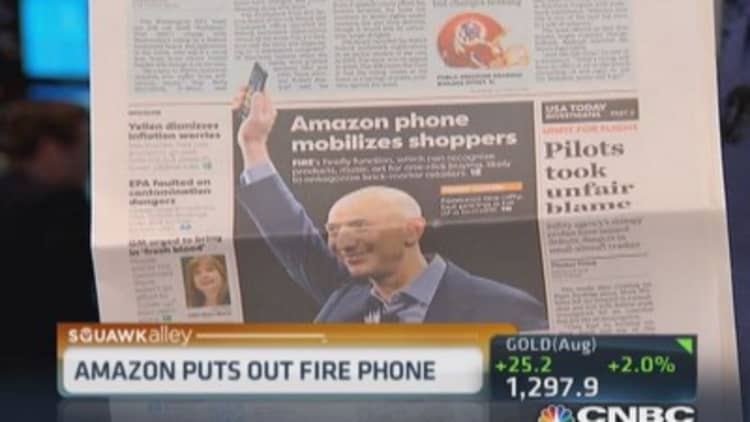Roku CEO Anthony Wood has grown so accustomed to fending off the world's largest tech companies that Amazon.com's deeper dive into the streaming TV market is little more than a calendar item.
On Monday, Amazon introduced the Fire TV Stick, a $39 dongle that plugs into a Web-enabled television's HDMI port. Roku, which has been on the market with streaming boxes since 2008, introduced its owns stick in late 2012 and sells it for $50.
Google has been trying to crack the connected TV business for years, most recently with its $35 Chromecast stick in 2013. And, of course, there's the $99 Apple TV.
Through it all, Roku has sold as many devices in the past 18 months as it did in the previous five years, announcing in September that it's topped 10 million total units. According to a July report from Parks Associates, 44 percent of U.S. homes with a streaming device use Roku, topping Apple's 26 percent.

"Our sales have never been better," Wood said in an interview. "Every time these things happen, the market grows and sales accelerate."
Amazon jumped into the hardware side of the market earlier this year with a $99 streaming box, joining a crowded field that includes Apple, Google and TiVo. They all allow customers of Netflix, Hulu and HBO Go to watch shows and movies on demand along with an assortment of sports, news and music channels.
With HBO and CBS rolling out streaming-only options, there's a land grab for consumers seeking alternatives to traditional pay TV.
Wood says that Roku has several advantages over its deep-pocketed rivals. In addition to being first to market and having over a half decade of experience, Roku's singular mission is to sell boxes and promote the services on top.
Amazon, Apple and Google, meanwhile, compete elsewhere, and are inclined to promote their own products over others. Neither Chromecast nor Apple TV, for instance, includes Amazon's Instant Video service.
"We have more content, it's simpler to use, and we're neutral," Wood said. "Everyone else has an agenda."
Read MoreI could kick myself over Netflix
And because streaming is the heart of Roku's business, it has the attention of the entire 300-person company.
But Roku is no longer just about selling end-to-end devices with its own hardware. The company is licensing its software to serve as the operating system for Web TVs. Asian manufacturers Hisense and TCL are selling Roku-powered TVs that have all the capabilities of streaming along with connecting to whatever cable box, game console or Blu-ray player a consumer uses. It's similar to a model that Google and Yahoo have unsuccessfully tested.
Growing faster than its hardware or licensing business, Wood said, is the company's advertising unit. Roku is showing display ads on its main menu, promoting films like "Dawn of the Planet of the Apes" or "The Lego Movie." Some channels offer free ad-supported content, where the commercials come from Roku's stable of advertising partners.
That all adds up to a higher margin business than one that relies solely on selling boxes and sticks. Better profitability has made it easier to attract investors, which was historically a challenge for Roku.

This month, the company raised $25 million in private capital, bringing its total amount raised to $165 million. Investors include British Sky Broadcasting (BSkyB), Hearst, Fidelity and Menlo Ventures.
"The last financing round was the easiest we've ever done," Wood said. He added that thanks to the high-priced acquisitions of companies like Nest and Dropcam as well as the successful GoPro initial public offering, "hardware is not quite as frowned upon."
The Wall Street Journal reported last week, citing people familiar with the matter, that Roku is working with banks to prepare for an IPO that could raise up to $150 million. Wood declined to comment on future financing, but said the company has plenty of cash.
Read MoreGoPro for the holidays?
He's now gearing up for the Christmas holidays. The Consumer Electronics Association predicts that celebratory spending on tech will climb 2.5 percent this year to a record $33.8 billion. In the past, Roku has done a massive holiday branding campaign in San Francisco, plastering banners across the subway system.
Wood said there will be no such blitz this year, but the company is spending plenty on online ads to reach shoppers searching for streaming devices. Roku will also have coupons in print publications for offers like $10 off at Best Buy.
For Roku, holiday marketing is no longer about consumer awareness; it's about trying to beat back the tech giants.



